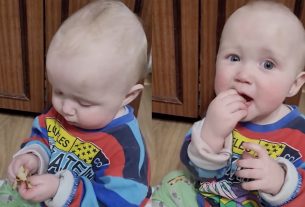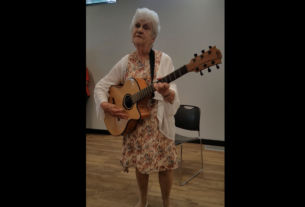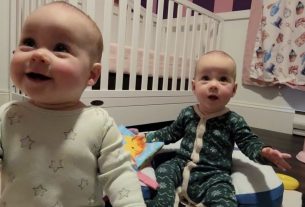A country lout—uncouth and crude—whose idea of good manners seemed to begin and end with not smacking too loudly. His life was laughably primitive: by day he hauled some kind of goods around in his battered car, and night after night he sat glued to his computer, from which came explosions and the clatter of tank treads. To me, he embodied everything I had fiercely tried to protect my Sashenka—my bright, delicate Alisa—from.
I brought every ounce of eloquence to bear, every motherly argument, every ultimatum. But he, that simpleton, used an ancient, dirty, foolproof weapon—he put a child under my girl’s heart. My boiling outrage broke against a cold, calculating fear: I had seen enough dramas to know that if I insisted on my way now, I risked losing grandchildren forever, and my daughter would be left with a wound that would never heal. I had to grit my teeth and stage that hateful wedding. And then he had the nerve to mention renting an apartment! Imagine—spiriting my little darling off to some cramped hole! Absolutely not. I moved them in with me, gave them the big room—as if installing in my paradise a nagging, alien demon.
From then on, my house filled not only with foreign sounds—loud laughter, the thud of his heavy boots—but with a quiet, constant chill of despair.
“Sweetheart, is that man of yours shooting away at his toys again?” My voice twanged like a taut string with pent-up anger. “You’re on your feet all day with Sofiyka, you’re exhausted! He could at least help you rest instead of burying his face in a monitor!”
“Mama, he gets so tired—this helps him switch off,” Alisa chirped, and in her eyes I read that treacherous tenderness that undid all my efforts. “He promised he’ll be done soon and go read our daughter a story. Don’t pick on him, please.”
To be honest, sometimes—very rarely—I caught myself thinking he wasn’t entirely hopeless. I’d been widowed ten years earlier, and in that time I’d learned to change lightbulbs with my own hands and even fix a jammed lock—my small, bitter victory. And he… Without a word or a reminder, he fixed every cabinet door in the kitchen, installed a new faucet, put our warped bookcase back together. His hands, rough and strong, could do what mine could not. But I drove those thoughts away. Better cupboards forever smelling of paint than to accept that this outsider had set his sights on our bright three-room apartment and wrecked my daughter’s shining future. Alisa could have glittered on the Bolshoi’s stage, living out my unrealized dream; now she was destined to teach the basics of choreography for a pittance at the local community center. No—he was bad. Very bad.
And Maksim, it seemed, was blind and deaf to my dislike. He called me Mom, and that word tied my stomach in knots. Mom! What right did he have?
“Mom, this is unbelievably good!” he praised any culinary experiment of mine, even the worst of them. I burned to shout that Alisa’s plate held a cutlet of choice veal, while his was made from cheap chicken mince, generously bulked out with bread crumbs.
“By the way, normal people don’t just play games on a computer—they earn money with it,” I remarked acidly once at dinner, ladling him soup—clear broth with scrawny circles of carrot—while my daughter’s bowl boasted rich chunks of meat and vegetables. “Look at Lyudmila Stepanovna’s son: he works as a programmer at a big firm, already bought himself an apartment.”
“I applied to study programming too,” Maksim replied evenly, breaking off a piece of the stale bread I had deliberately set out for him.
“And what, you didn’t pass your exams?” I couldn’t keep the bite out of my smile.
“I got in,” he chewed, then looked at me with those oddly light eyes. “But I couldn’t keep studying. I was expelled.”
“Cut class, I suppose,” I nodded with feigned sorrow. “Sat there with your virtual tanks.”
“Mom, come on!” Alisa flared. “Max worked nights unloading train cars so we’d have enough to live on! I told him a thousand times to go back, switch to part-time, but he…”
“I see,” I cut her off. “That would require using your head, not just turning a steering wheel. Hard, isn’t it.”
My daughter shushed me angrily, and with the satisfaction of duty fulfilled, I swept off to my room, leaving coffin-quiet behind me.
If I could still somehow tolerate Maksim himself, the thought of his relatives filled me with icy dread. Once was more than enough—at the wedding: loud, brazen, their eyes tallying the price of the chandelier and the furniture. So when Maksim, eyes on the floor and shifting from foot to foot, said that his adoptive parents wanted to drop by “for a day,” the world blurred before my eyes.
“They can spend the night in a hotel,” I breathed, feeling goosebumps race down my back.
“That’s what I told them,” he agreed quickly. “They’ll just stop by for dinner. They want to get to know you better.”
I had already opened my mouth to pronounce a categorical “no,” but as always, Alisa intervened:
“Oh, that’s wonderful! I’ll bake that apple pie and make a chicken roulade! Mom, and you can do your signature pilaf! It’ll be so cozy!”
I looked at her glowing, naively hopeful face—and gave in. How could I spoil her happiness? The milk wouldn’t curdle because of those people…
“Fine,” I muttered, betraying myself. “Let them come.”
My worst expectations were exceeded. They burst into the apartment with loud exclamations, didn’t take off their outdoor shoes, brought neither treats nor even a modest gift for their granddaughter. Their talk circled around the horrifying prices at Moscow hotels and hints about how spacious and well-off we lived.
At dinner, as I parsimoniously spooned pilaf onto his plate, Maksim’s mother suddenly said loudly, for the whole apartment to hear:
“Hey, co-in-law, give that glutton a smaller portion! He eats like a common loader! When we took him out of the orphanage, he did nothing but eat for the first six months. As if he was afraid the food would disappear. He never thought he was eating his sisters out of their share!”
The air froze. I stopped with the ladle in midair, my bewildered gaze darting from pallid Maksim to his smug “mother,” and then to Alisa. In my daughter’s wide, shining eyes I saw she was hearing this for the first time.
“You… you never told me,” she whispered, looking at her husband.
“Exactly!” the in-law cried, as if she’d been waiting for it. “Ungrateful boy! We raised him, took the last bite from our mouths, and he went and ran off! To the city, to study—can you imagine? Well, we beat that nonsense out of him quickly. Explained how much money we’d sunk into him, and we still had our own blood daughters to marry off. He went to work and started helping us. We educated one sister, and now we’ve brought the second to the capital—she insists on an institute here. We’re counting on you, Maksyusha!”
I did not let them stay the night. I stood my ground, weathered their sticky hints and heavy looks. I waited until Alisa went to put Sofiyka to bed, then motioned Maksim over. He walked toward me like a man to the scaffold, shoulders hunched, eyes empty.
“So you didn’t drop out because you were lazy? You were working for them?” I nodded toward the door through which those people had just disappeared.
“Mom, don’t judge them too harshly,” he asked quietly, almost soundlessly. “They gave me a roof over my head. They fed me… Before that, I had never eaten my fill, or anything that tasty.” He paused, drew breath, and added a bit louder, “To be honest, the food here is even better. You put so much care into it for me.”
There was not a drop of reproach or flattery in his voice. Only a bitter, disarming sincerity. And in that moment something cracked inside me, the wall I had so carefully built over these months collapsed.
“And studying… was that what you yourself wanted?” I asked, my voice suddenly hoarse.
“Very much,” he answered—a verdict on me, on my blindness, on my prejudice. “But my sister needed help. And now… now I have Alisa and Sofiyka. I have to provide for them. That matters more.”
Silence fell—dense and ringing. I looked at this big, strong man with the eyes of a hunted child and, for the first time, did not see an enemy. I saw someone betrayed by those who should have supported him. Someone whose dream had been broken. Just as I had tried to break his family.
“I understand,” I said slowly, and without another word, turned and went to my room.
The next morning, the cutlets on his plate were exactly the same—large, golden-brown, made from choice veal. And a week later, pretending to be completely absorbed in watering the geraniums on the windowsill, I tossed into the air, as if in passing:
“Maksim, I spoke with the director of our cultural center. They need a capable administrator who can fix computers and set up office equipment. The pay will be the same as you get now, but the schedule is easier. More free time. So I have a condition for you…”
“I agree!” he blurted out at once, not even letting me finish. “I’ll agree to anything, Mom!”
“Just one condition,” I turned and looked him straight in the eyes. “You’ll reenroll and finish your degree. All the way.”
The room exploded with Alisa’s happy squeal. She threw her arms around my neck and pressed her tear-wet cheek to my shoulder.
“Mommy! You’re the best in the world! I love you so much!”
Maksim stood silently. In his eyes—so light and clear—I read confusion, disbelief, and some new, timid hope.
“And your cooking… honestly, it’s gotten even tastier,” he finally whispered, his lips quivering into something like a smile.
I shrugged, pretended nothing special had happened, and turned back to my flowers to hide the treacherous dampness on my own lashes. No. He wasn’t so bad, this Maksim. Not at all. And that icy draft in my home at last died down, replaced by the warm, living breath of a real family.



